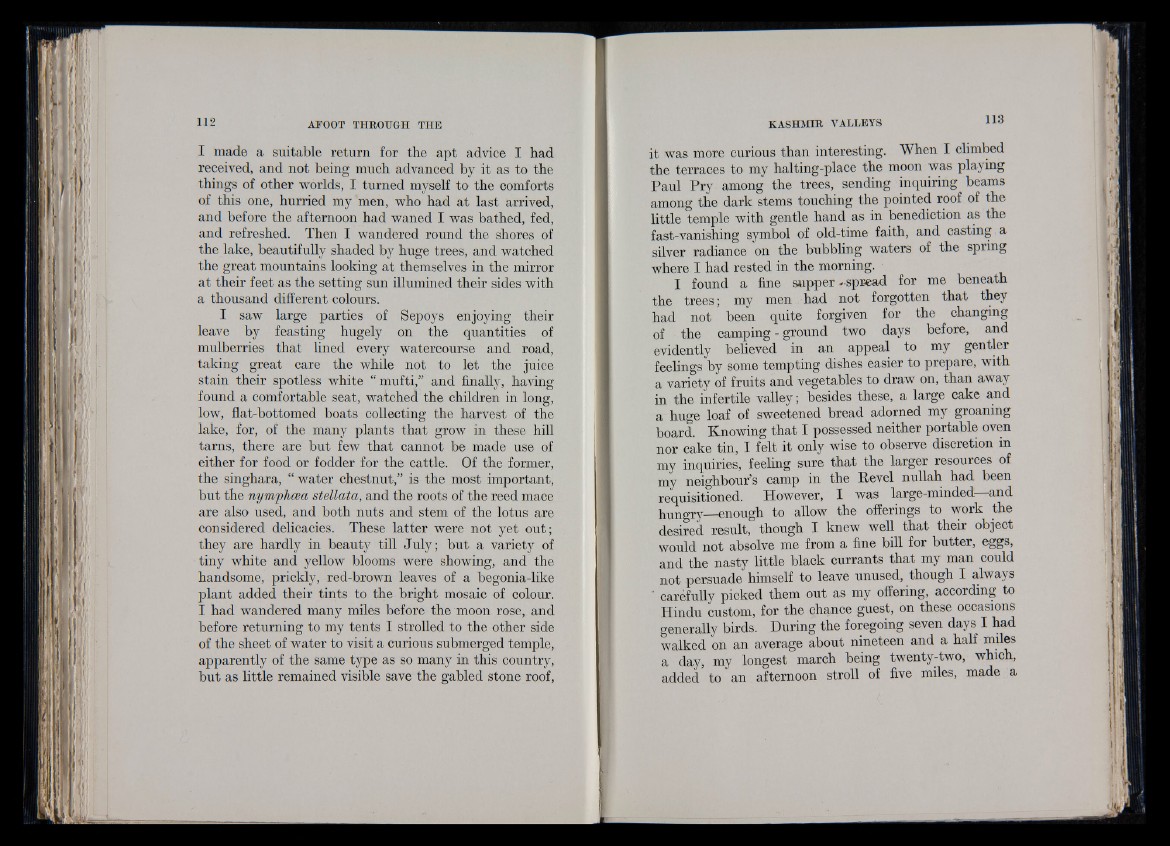
I made a suitable return for the apt advice I had
received, and not being much advanced by it as to the
things of other worlds, I turned myself to the comforts
of this one, hurried my men, who had at last arrived,
and before the afternoon had waned I was bathed, fed,
and refreshed. Then I wandered round the shores of
the lake, beautifully shaded by huge trees, and watched
the great mountains looking at themselves in the mirror
at their feet as the setting sun illumined their sides with
a thousand different colours.
I saw large parties of Sepoys enjoying their
leave by feasting hugely on the quantities of
mulberries that lined every watercourse and road,
taking great care the while not to let the juice
stain their spotless white “mufti,” and finally, having
found a comfortable seat, watched the children in long,
low, flat-bottomed boats collecting the harvest of the
lake, for, of the many plants that grow in these hill
tarns, there are but few that cannot be made use of
either for food or fodder for the cattle. Of the former,
the singhara, “water chestnut,” is the most important,
but the nymphcea stellata, and the roots of the reed mace
are also used, and both nuts and stem of the lotus are
considered delicacies. These latter were not yet out;
they are hardly in beauty till July; but a variety of
tiny white and yellow blooms were showing, and the
handsome, prickly, red-brown leaves of a begonia-like
plant added their tints to the bright mosaic of colour.
I had wandered many miles before the moon rose, and
before returning to my tents I strolled to the other side
of the sheet of water to visit a curious submerged temple,
apparently of the same type as so many in this country,
but as little remained visible save the gabled stone roof,
it was more curious than interesting. When I climbed
the terraces to my halting-place the moon was playing
Paul Pry among the trees, sending inquiring beams
among the dark stems touching the pointed roof of the
little temple with gentle hand as in benediction as the
fast-vanishing symbol of old-time faith, and casting a
silver radiance on the bubbling waters of the spring
where I had rested in the morning.
I found a fine supper-spread for me beneath
the trees; my men had not forgotten that they
had not been quite forgiven for the changing
of the camping - ground two days before, and
evidently believed in an appeal to my gentler
feelings by some tempting dishes easier to prepare, with
a variety of fruits and vegetables to draw on, than away
in the infertile valley; besides these, a large cake and
a huge loaf of sweetened bread adorned my groaning
board. Knowing that I possessed neither portable oven
nor cake tin, I felt it only wise to observe discretion in
my inquiries, feeling sure that the larger resources of
my neighbour’s camp in the Revel nullah had been
requisitioned. However, I was large-minded and
hungry—enough to allow the offerings to work the
desired result, though I knew well that their object
would not absolve me from a fine bill for butter, eggs,
and the nasty little black currants that my man could
not persuade himself to leave unused, though I always I carefully picked them out as my offering, according to
Hindu custom, for the chance guest, on these occasions
generally birds. During the foregoing seven days I had
walked on an average about nineteen and a half miles
a day, my longest march being twenty-two, which,
added to an afternoon stroll of five miles, made a